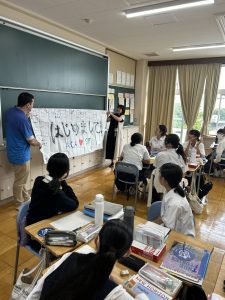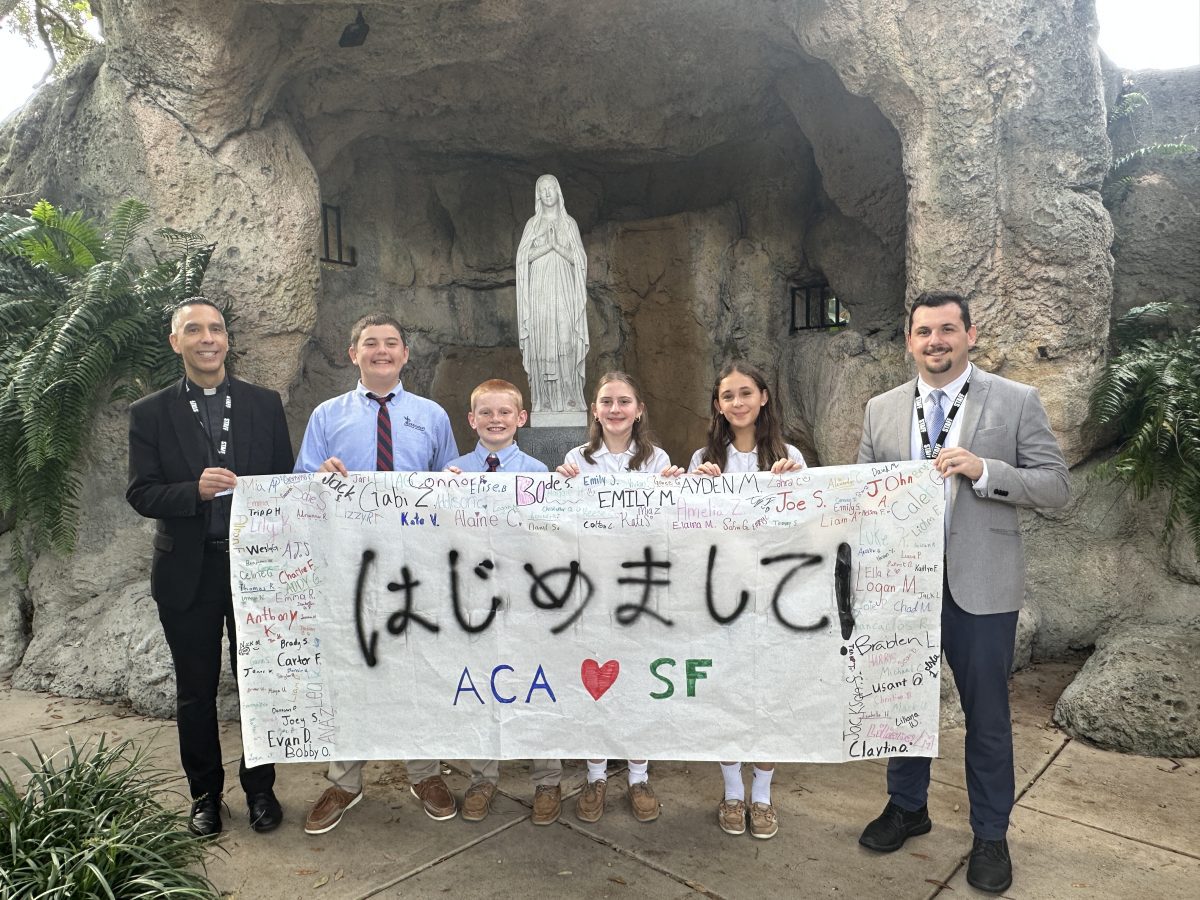ALTAMONTE SPRINGS | It’s about more than having a pen pal. The Hikari (Light) Project is about evangelization through the building of friendships across cultures.
Through a letter and video exchange with a 120-year-old Catholic school in Japan, Robert Gerzanick, a religion teacher at Annunciation Catholic Academy in Altamonte Springs, hopes his seventh- and eighth-grade students discover the universality of the Catholic faith and share the light of Christ.
The idea began four years ago when Gerzanick began taking martial arts classes. As a history buff, he always found the Japanese culture interesting and grew up with its comic influences in the 1990s.
“I think a lot of kids today are interested in Japan as a culture because of manga and animé comics,” he said, noting the books have outsold American superheroes for a decade. “In education, we talk a lot about meeting kids where they are, and kids have an interest in Japanese pop culture.”
As a doctoral student at St. Leo University in Applied Theology, he thought the opportunity to combine this interest and Catholic theology was perfect.
“When somebody is without food and shelter, sharing the light of Christ is easier,” Gerzanick said. “When someone is hungry and needs a full belly, there’s an opportunity to share Christ’s love with them. How do we share Christ’s love with a part of the world where students don’t have those more temporal and corporal challenges? That’s an area of interest for me. I’m hoping to show my students evangelization and interfaith dialogue. Friendships are also forms of evangelization.”
Taking a page out of the New Evangelization theology of St. Pope John Paul II and Pope Benedict XVI, which calls all Catholics to be evangelized and then go forth to evangelize, he reached out to Catholic schools in Japan to make a connection. Just before a planned trip to Japan, Tom Illingworth, an Eikawa (English Conversation) teacher from the Shizuoka Futaba Gakuen contacted Gerzanick. Illingworth works at the 120-year-old Catholic, all girls middle/high school in Shizuoka, Japan. He invited the American to visit the school and solidify a curriculum plan.
During his visit, Gerzanick presented students with a banner signed by his academy students that read, “Hajimemashite,” which means, “Nice to meet you.” They proudly hung it in Mari Nagao’s English grammar classroom.
Although the school is Catholic and religion is a subject, most students and even many of the teachers are not Catholic. Gerzanick explained education there is seen as an elevator to better college opportunities, better work opportunities.
“It’s a major cultural difference in the way they approach education,” he said.
Consequently, the Shizuoka Futaba Gakuen’s goals are a little different. Gerzanick expressed his “goal of sharing the light of Christ through friendship,” and they understand that is the focus for Annunciation academy students.
In turn, the Japanese teachers hope their students will have an increased opportunity to practice English conversation. Gerzanik prays that through this exchange, students’ faith will grow deeper on both sides, and those who are not Catholic, might be evangelized through the building of friendships.
He is going forward with a New Evangelization mindset. “This idea of engaging people through friendship; engaging people with familiarity of the Catholic religion and allowing the Holy Spirit to work how He chooses,” he said.

Annunciation students just finished writing first drafts of letters to their Japanese friends. Their rubric included an introduction, sharing their interests, facts about the school, their faith, and questions for their peers. Early next year they will send a video.
“Remember, our friends in Japan, despite attending a Catholic school, may not be themselves Catholic. It’s important when discussing your faith and potentially asking about theirs, to show respect for their faith and traditions. It’s not about focusing on rapid conversion. We’re showing them the hikari or light of Christ through friendship.”
Kate S., an eighth-grader at Annunciation said she was excited to learn about “someone who comes from such a different culture.” She had the chance to visit Japan a few years ago and thinks it will be fun to learn more about students like her who live there.
Seventh-grader Maggie H. is excited, too. “I look forward to extending a hand of friendship and sharing my relationship with God with them, even if we have different traditions.”
During his papacy, Pope Benedict XVI called for the re-proposing of the Gospel “to those regions awaiting the first evangelization and to those regions where the roots of Christianity are deep but who have experienced a serious crisis of faith due to secularization.” In many ways, this is the situation in Japan where those proclaiming themselves Catholic are declining in droves. Gerzanick saw this as an opportunity to re-evangelize in a sense, to repropose the Gospel.
“I want (my students) to think bigger. I want them to realize that being Catholic is a universal thing,” he said. “We’ve been talking about the four marks of the Church — one, holy, catholic and apostolic. Sometimes middle- schoolers don’t think about what ‘catholic’ really means. It means universal. It means the Church is for everybody; it’s a worldwide Church. I want them to have a global understanding of our faith — that it’s not just located in Altamonte Springs, the Diocese of Orlando, or Europe. It’s in every corner of the globe, providing an opportunity to share the light of Christ everywhere.”
By Glenda Meekins of the Florida Catholic staff, October 31, 2024

